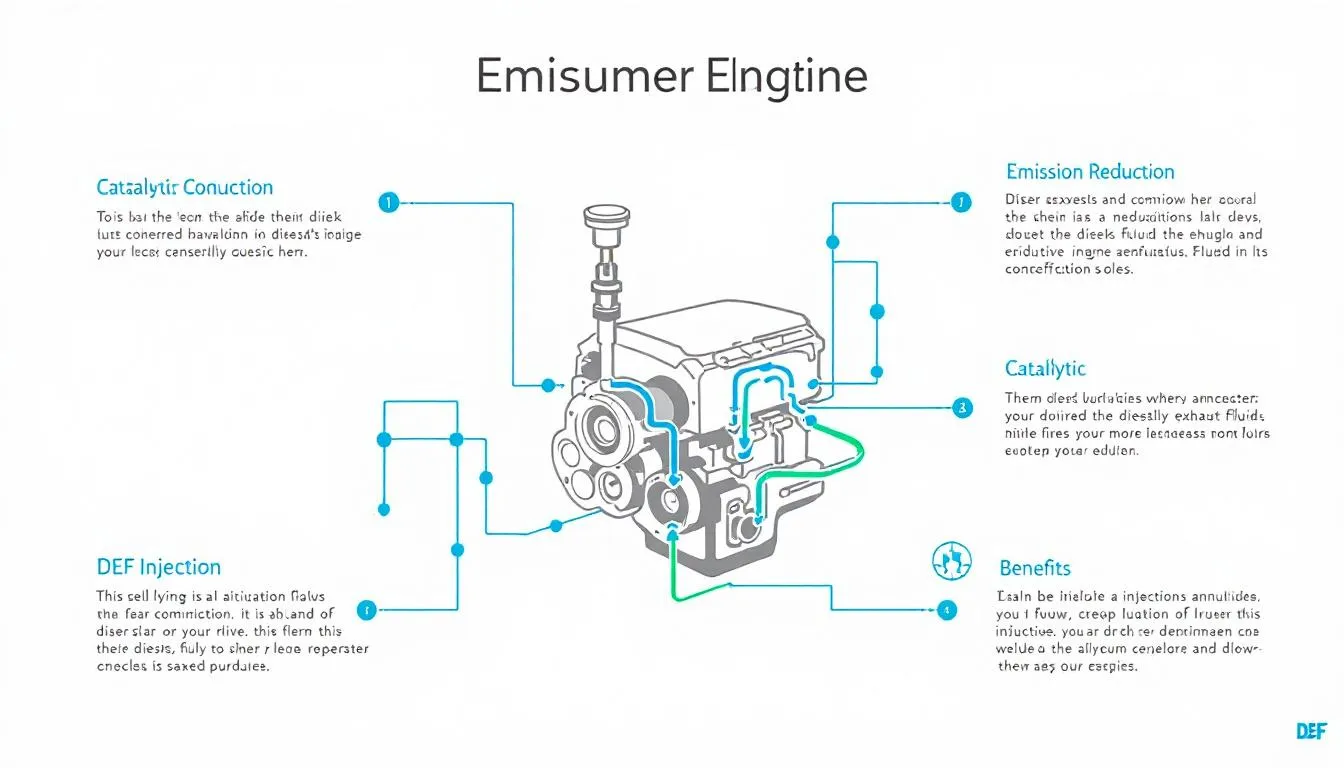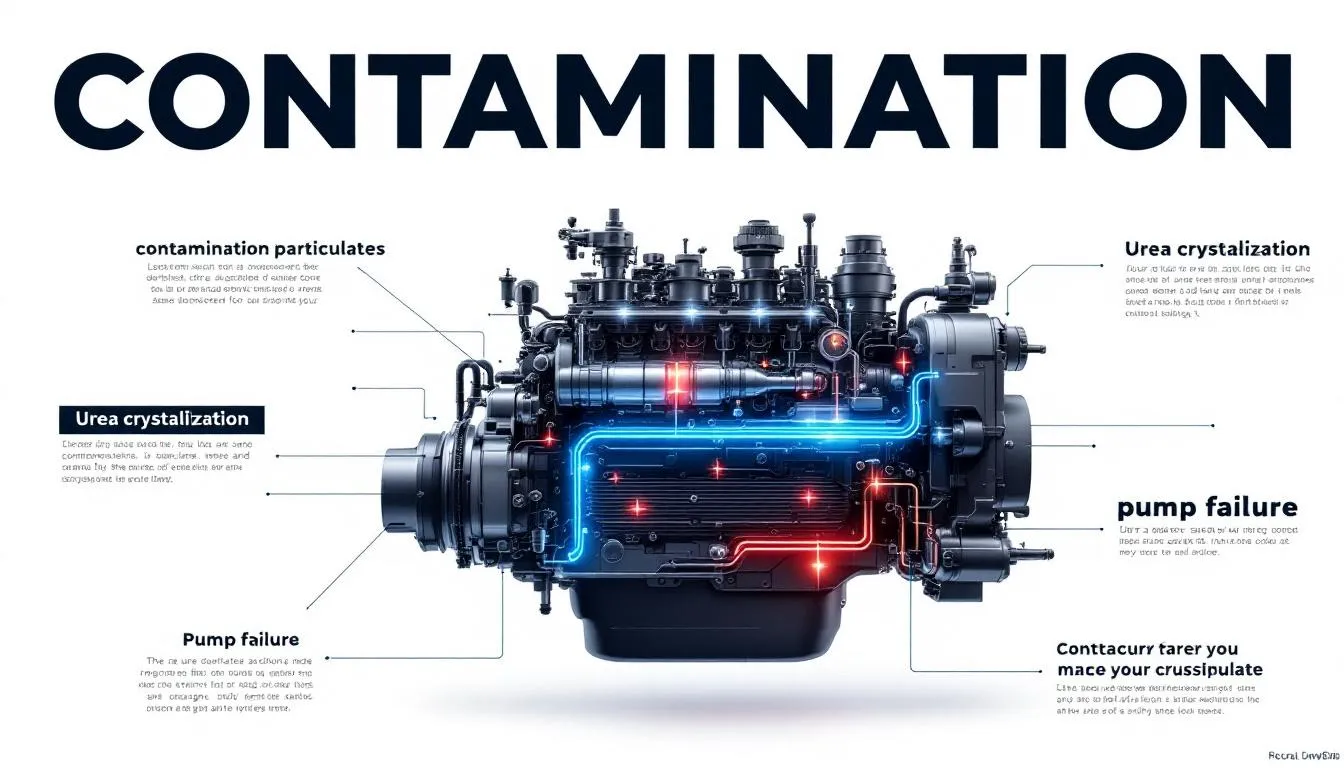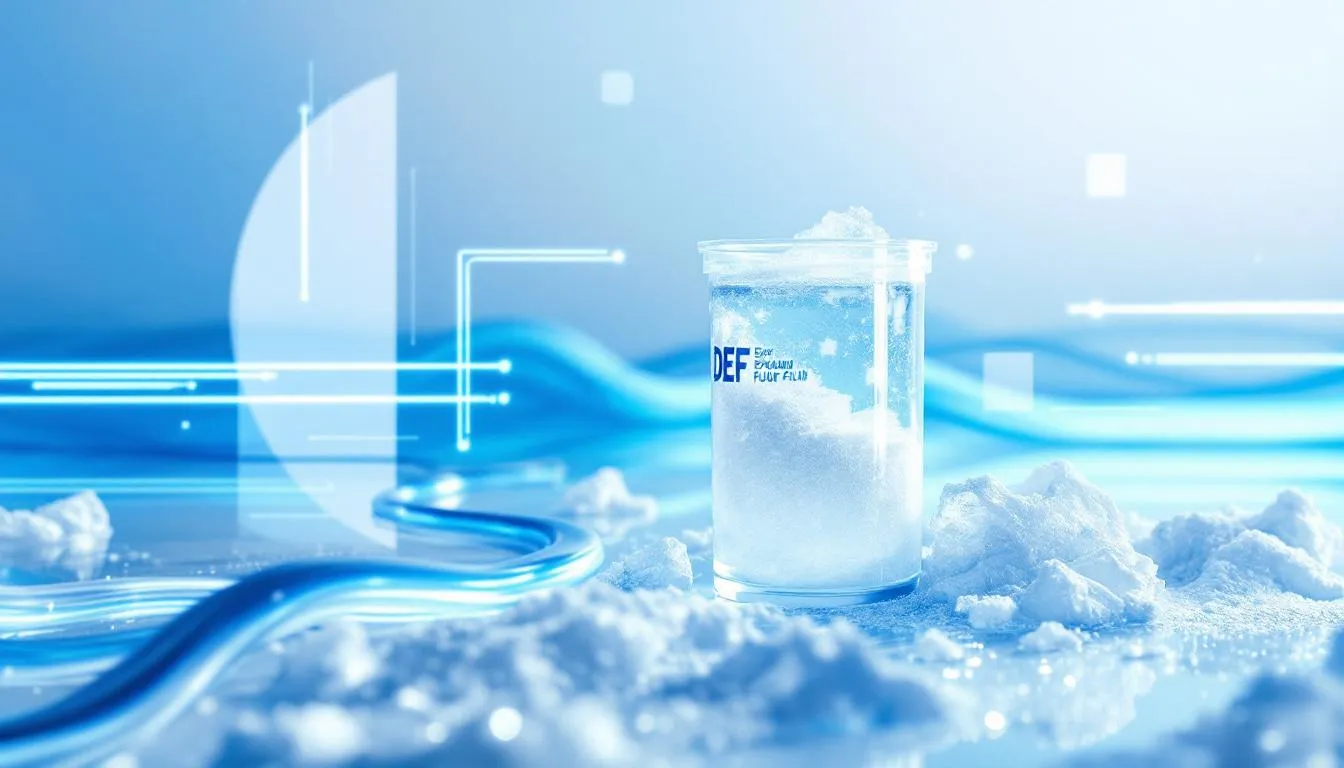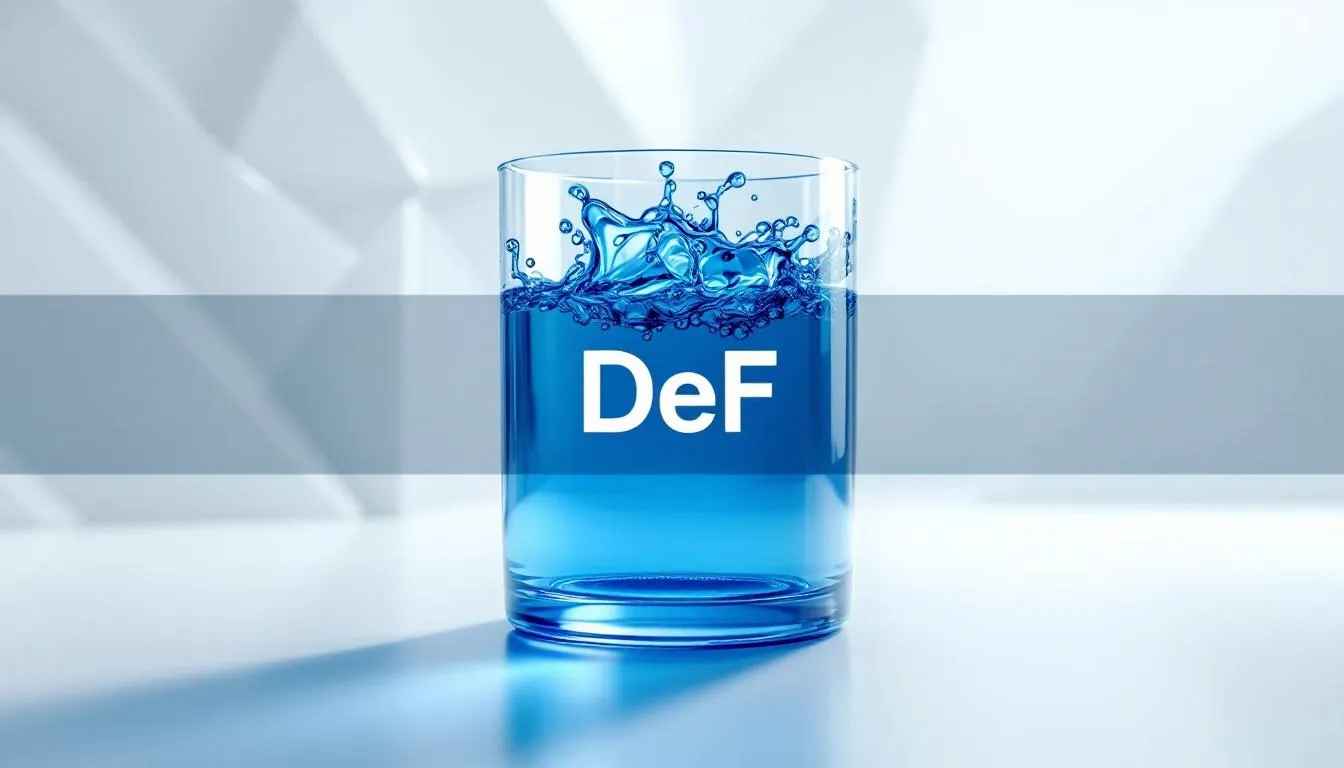Diesel owners often face DEF problems that affect engine performance. This guide covers common DEF problems and their solutions, helping you maintain your diesel engine efficiently.
Key Takeaways
- Understanding and maintaining Diesel Exhaust Fluid (DEF) is vital for reducing NOx emissions and enhancing diesel engine performance.
- Common DEF issues include contamination and freezing, which can lead to serious engine problems; proper storage and usage practices are essential.
- Utilizing advanced technology and regular maintenance can significantly improve DEF management, preventing costly repairs and ensuring compliance with emissions standards.
Understanding Diesel Exhaust Fluid (DEF)

Diesel Exhaust Fluid (DEF) is a crucial component in modern diesel engines. Composed of 32.5% urea and 67.5% deionized water, def fluid is specifically designed to reduce nitrogen oxides (NOx) emissions, which are harmful pollutants produced during the combustion of diesel fuel. Injecting DEF into the exhaust stream converts NOx emissions into harmless nitrogen and water vapor, enabling diesel engines to meet stringent emissions standards.
The proper ratio of urea to deionized water in DEF is critical for its effectiveness. This precise mixture ensures that the DEF can efficiently break down NOx into less harmful substances, making it a key player in emissions control systems like Selective Catalytic Reduction (SCR). Moreover, DEF is environmentally friendly, being non-toxic and biodegradable, which adds to its appeal as a sustainable solution for reducing vehicle emissions.
Understanding the role of DEF in your diesel engine is the first step in maintaining its performance and longevity. DEF consumption typically ranges from 2-3% of diesel fuel consumption, so it’s essential to keep an eye on your DEF levels and ensure you’re using a high-quality product. This practice significantly reduces the risk of engine derating and other performance issues.
Common DEF Contamination Issues

One of the most significant problems diesel owners face is contaminated DEF. Water contamination can occur due to improper handling, storage, or using containers previously used for other fluids. Signs of contaminated DEF include discoloration, an unpleasant odor, and a cloudy appearance. If overlooked, these issues can lead to significant damage to the SCR system components, resulting in costly repairs.
Contaminated DEF can also cause clogging in DEF pumps and injectors, affecting the fluid distribution and leading to DEF system failures. To prevent potential contamination, follow these guidelines:
- Always store DEF in clean, sealed containers.
- Avoid exposure to moisture and direct sunlight.
- Ensure that storage facilities are free from dust and contaminants.
Accidental mixing with other substances like diesel fuel or oil can also cause DEF contamination. Using dedicated containers and dispensing equipment can help prevent such issues. Following these best practices helps maintain DEF quality and avoids significant problems down the line.
Recognizing Low DEF Levels
Keeping an eye on your DEF levels is crucial for maintaining optimal engine performance. Most modern diesel vehicles are equipped with DEF level sensors and warning lights to alert you when DEF levels are low. An amber warning light indicates low DEF levels, while a red light signals that the DEF tank is empty and requires immediate attention. Additionally, using a def gauge can help you monitor these levels more accurately.
Ignoring these warning signs can lead to significant problems, such as engine derating and reduced performance. If DEF levels drop to critically low levels, the vehicle may enter limp mode, resulting in reduced power and decreased fuel economy. To prevent these issues, it’s essential to regularly check and top off your DEF tank, especially during routine maintenance.
When the DEF warning light activates:
- Refill the DEF tank immediately to avoid further complications.
- Use high-quality DEF to ensure the efficiency of the SCR system and maintain the overall health of your engine.
- Stay vigilant and proactive to avoid the pitfalls of low DEF levels, ensuring your diesel engine runs smoothly.
Dealing with Frozen DEF

DEF can freeze in cold weather, with its freezing point at around 12°F (-11°C). When DEF freezes, it can expand by about 7%, potentially causing damage if the container is overfilled. However, if DEF freezes inside the tank, it will thaw properly as the engine runs, thanks to the tank’s heating element.
To prevent freezing issues with DEF:
- Store DEF in elevated, snow-free areas.
- Avoid adding substances like antifreeze, which can compromise the fluid’s purity.
- If the DEF hose is unable to dispense fluid due to freezing, disconnect the hose and warm it to thaw any leftover product.
Remember, DEF is safe to use after thawing, as its properties remain intact even when frozen.
Proper storage conditions are key to avoiding frozen DEF. Proper storage and preventive measures minimize disruptions and maintain diesel engine efficiency during cold weather.
Identifying and Fixing Crystal Deposits
Crystal deposits in the DEF system can be a real headache for diesel owners. These white crystals form when water evaporates from DEF, leaving behind urea crystals. Signs of crystal deposits include reduced engine performance, fault codes (such as P20EE), and system malfunctions.
To minimize the risk of crystallization and ensure the smooth operation of your DEF system, follow these maintenance tips:
- Regularly clean dispensing nozzles and equipment.
- If you notice any signs of crystal deposits, use a product like Rislone DEF Crystal Clean® to clean the system and restore its functionality.
- Perform regular maintenance and cleaning to prevent crystal deposits.
Preventing crystal deposits involves not only regular cleaning but also proper handling and storage of DEF. Keeping your DEF system clean and free from crystallization helps avoid performance issues and extends the life of your diesel engine.
Handling DEF System Failures
When the DEF system fails, it can lead to serious consequences, including engine derating. Regular inspections can help identify def issues early, focusing on components such as:
- The DEF tank
- DEF lines
- def injector Clogged or damaged DEF injectors can severely disrupt the injection process, requiring thorough inspection and potential replacement. Additionally, addressing def system problems promptly can prevent further complications.
The DEF pump is another critical component that needs to be checked for power supply issues and blockages to ensure proper fluid delivery. Prevention is always more cost-effective than repairs, so regular maintenance and inspections are crucial to avoid issues like a bad def pump.
Staying proactive and conducting regular checks helps handle DEF system failures effectively, avoiding significant damage to your diesel engine and truck. Proper maintenance and timely interventions can save you from costly repairs and keep your vehicle running smoothly.
Proper DEF Storage Techniques
Proper storage of DEF is essential to maintain its quality and effectiveness. DEF should be stored in an isolated area away from other fuels and chemicals to reduce the risk of contamination. Optimal storage temperatures range between 12°F and 77°F to preserve the fluid’s shelf life and efficacy.
To properly store and handle DEF:
- Use high-density polyethylene (HDPE) containers to prevent contamination and degradation.
- Keep DEF out of direct sunlight to preserve its urea content.
- When purchasing DEF, always verify the expiration date to ensure product effectiveness.
Proper storage techniques not only maintain the quality of DEF but also prevent issues related to freezing and contamination. Following these guidelines ensures that your DEF remains effective and keeps your diesel engine running smoothly.
Utilizing Technology for DEF Management
Advanced technologies can significantly enhance DEF management. DEF quality sensors, telematics systems, and RFID technology can monitor DEF quality and levels in real-time. Integration with vehicle telematics allows for remote monitoring and management of DEF-related parameters, providing valuable insights into DEF consumption and dispenser status.
Carly’s On-Board Diagnostics (OBD) tool empowers users by enabling them to read errors in their vehicles, discover problems, and manage their DEF systems effectively. Carly also offers direct, professional help with car problems through a mechanic chat, providing users with immediate support and advice.
Utilizing these technologies not only ensures efficient DEF management but also empowers diesel owners to take control of their vehicle’s maintenance. Leveraging advanced tools maintains optimal DEF quality and performance, ultimately extending the life of your diesel engine.
Choosing High-Quality DEF

Opting for high-quality DEF is crucial for the optimal performance of your diesel engine. High-quality DEF prevents clogging and ensures the efficiency of the SCR system. Look for DEF that is clear, free of particles, and carries API certification to ensure it meets industry standards.
To ensure the quality of DEF:
- Manufacture DEF using deionized water to maintain high purity and prevent contamination.
- Verify DEF quality by checking the batch information, manufacturing date, and shelf life.
- Source DEF from certified suppliers.
- Conduct periodic testing to help ensure its quality.
Using high-quality DEF minimizes the risk of corrosion, clogging, and increased emissions, ultimately protecting your diesel engine from significant damage. Choosing the best course of DEF available maintains your vehicle’s performance and ensures adherence to emissions standards.
Preventative Maintenance for DEF Systems
Regular maintenance of DEF systems is essential to prevent system malfunctions and ensure the efficiency of your SCR system. Steel def storage tank with secondary containment are recommended for storing DEF due to its corrosive properties. Performing fuel polishing can help restore the quality of contaminated DEF in the fuel tank.
Key maintenance tasks for the SCR system include:
- Replacing filters every 200,000 miles or 6,500 engine hours to maintain performance.
- Monitoring urea crystal buildup.
- Educating drivers about DEF maintenance and proper handling to minimize operational issues, which can be supported by the maintenance staff.
Following a comprehensive maintenance routine and staying proactive prevents severe damage to your diesel engine and ensures its longevity. Preventative maintenance not only saves costs but also keeps your vehicle running efficiently.
Summary
In summary, maintaining your DEF system is crucial for the performance and longevity of your diesel engine. From understanding the composition and purpose of DEF to recognizing and addressing common issues like contamination, low levels, and freezing, this guide provides comprehensive solutions for diesel owners.
By utilizing advanced technologies, choosing high-quality DEF, and conducting regular maintenance, you can ensure your vehicle meets emissions standards and runs smoothly. Stay proactive, follow the best practices outlined in this guide, and you’ll be well-equipped to handle any DEF-related challenges.
Frequently Asked Questions
What is Diesel Exhaust Fluid (DEF)?
Diesel Exhaust Fluid (DEF) is a solution made up of 32.5% urea and 67.5% deionized water, designed to lower NOx emissions in diesel engines by transforming them into harmless nitrogen and water vapor. This helps in meeting environmental regulations and improving air quality.
How can I prevent DEF contamination?
To prevent DEF contamination, store it in clean, sealed containers away from moisture and direct sunlight, and avoid using containers that have housed other fluids. Additionally, ensure that your storage area is free from dust and contaminants.
What should I do if my DEF freezes?
If your DEF freezes, let it thaw naturally while the engine is running, as the tank’s heating element will assist in the process. To avoid future issues, ensure you store DEF under proper conditions to prevent freezing.
How can I identify high-quality DEF?
To identify high-quality DEF, look for a clear liquid that is free of particles and carries API certification. Additionally, check the batch information, manufacturing date, and shelf life for assurance of quality.
What are the benefits of using Carly’s OBD tool for DEF management?
Using Carly’s OBD tool for DEF management enables users to easily read error codes, identify issues, and obtain direct assistance from mechanics, enhancing vehicle maintenance and performance. This comprehensive support simplifies the management of DEF systems, ensuring optimal functionality.

